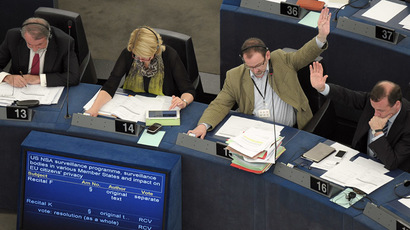Bugged by US spying, EU may sever ties with American internet providers

EU businesses are threatening to terminate relations with American internet providers in response to the National Security Agency surveillance scandal, the European Commission has warned.
Neelie Kroes, Vice President of the European Commission, said
that US providers of ‘cloud services,’ a technology that permits
clients to store data on remote servers, could suffer steep
losses if users fear the security of their material is at risk of
being compromised.
"If businesses or governments think they might be spied on,
they will have less reason to trust cloud, and it will be cloud
providers who ultimately miss out,” Kroes said. “Why would
you pay someone else to hold your commercial or other secrets if
you suspect or know they are being shared against your
wishes?"
The EC vice president then pointed to the “multi-billion euro
consequences” facing US internet companies in the wake of the
scandal.
"It is often American providers that will miss out, because
they are often the leaders in cloud services. If European cloud
customers cannot trust the United States government, then maybe
they won't trust US cloud providers either. If I am right, there
are multibillion-euro consequences for American companies. If I
were an American cloud provider, I would be quite frustrated with
my government right now."

On Thursday, the European Parliament overwhelmingly passed a non-binding resolution that says the US
should provide full disclosure about its email and communications
data, otherwise two EU-US transatlantic information-sharing deals
- the Terrorist Finance Tracking Program (TFTP) and Passenger
Name Records (PNR) - could be revoked.
Relations between Washington and Brussels suffered a setback in
June when former NSA analyst Edward Snowden leaked details of a
top-secret US data-mining surveillance program, known as Prism,
which operated both in the United States and the European Union.
Prism is said to give the NSA and FBI user information from some
of the world’s largest internet companies, including Google,
Facebook, Microsoft, Apple, Yahoo and Skype.
Der Spiegel cited a secret 2010 document alleging that the US
spied on internal computer networks in Washington, as well as at
the 27-member bloc's UN office and EU offices in New York.
The NSA paper also allegedly refers to the EU as a
"target.”
According to Der Spiegel, the US surveillance system spied on
some 500 million telephone and internet recordings in Germany
each month, ramping up fears that the United States was not
simply collecting data to prevent against acts of terrorism, but
was involved in full-scale industrial espionage.
In response to heated European criticism of the US surveillance
activities, US President Barack Obama this week seemed to
downplay the severity of the situation when he commented: "I
guarantee you that in European capitals, there are people who are
interested in, if not what I had for breakfast, at least what my
talking points might be should I end up meeting with their
leaders. That's how intelligence services operate."
During a Wednesday phone conversation with German Chancellor
Angela Merkel, Obama sought to reassure her that the United
States would provide the Europeans with details of their
surveillance program.
Meanwhile, in an effort to contain the damage from the
revelations, ambassadors to the European Union agreed on Thursday
to proceed with EU-US negotiations on a new transatlantic free
trade pact, scheduled to open in Washington on Monday.

During the EU-US trade negotiations it will certainly not go
unnoticed that crucial European positions in the trade talks may
already be compromised due to the wide-scale surveillance. EU
officials do not want the issue of America’s covert spy program
to be the elephant in the room which nobody talks about.
Dalia Grybauskaitė, the president of Lithuania, which takes over
the rotating six-month EU presidency this week, said on Thursday
that she awaits “information” – not apologies - from the
Americans over the spying allegations.
"They are open to co-operation. They are open to explain,"
she said. "I never seek an apology from anyone. I seek
information … We don't want to jeopardize the strategic
importance of free trade."
Grybauskaite insisted that the scandal, which has shown no sign
of abating, should not be allowed to obstruct the trade talks but
acknowledged that "some countries are very sensitive on this
question."
Meanwhile, Britain may also have some explaining to do on the
sidelines of next week’s trade talks since it was suggested that
the UK's Government Communications Headquarters (GCHQ), through a
system known as Tempora, has had access to the US internet
monitoring program since at least June 2010.
The European Commission vice president said that US companies
could suffer from the US government's covert
intelligence-gathering activities.
"Concerns about cloud security can easily push European
policy-makers into putting security guarantees ahead of open
markets, with consequences for American companies,” Kroes
warned. “Cloud has a lot of potential. But potential doesn't
count for much in an atmosphere of distrust."
Robert Bridge is the author of the book,Midnight in the American Empire, which
discusses the dangerous consequences of excessive corporate power
now prevalent in the United States.














